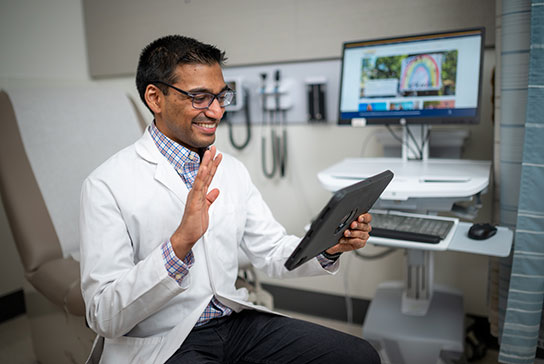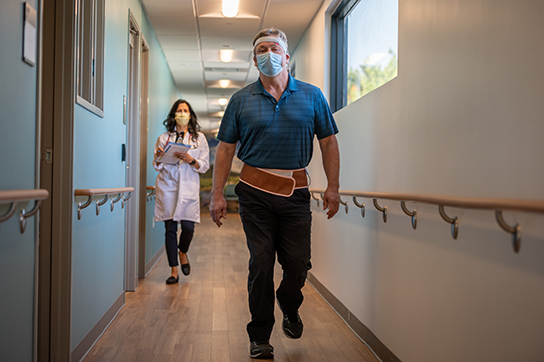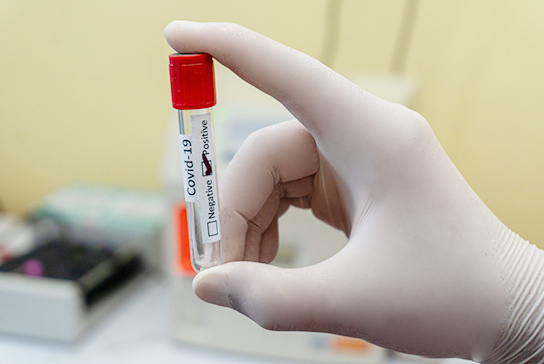Learn about available treatments if you get COVID-19.
What to do if you test positive for COVID-19
Updated Feb. 8, 2023
A guide to recovery at home for patients and their families
If you’ve tested positive for COVID-19, you may be worried for yourself and others with whom you've recently spent time. Below are steps to ensure you have the best chance for recovery and to help reduce your chance of infecting others.
With a confirmed positive COVID-19 test, you are most likely being sent home to rest, stay away from others, and recover. This is the case for more than 95% of people, as their symptoms do not require hospitalization. Some people have a higher risk for complications and should be monitored extra closely. For most people, COVID-19 symptoms tend to go away naturally as the body works to recover from infection.
If you've been vaccinated for COVID-19, you may not even realize you've been infected with the virus. Symptoms may not show up or be very mild. People who haven't received the COVID-19 vaccine may experience more severe symptoms. COVID-19 symptoms may include any combination of the following:
- fever or chills
- dry coughs
- shortness of breath associated with respiratory illness
- muscle pain or body ache
- headache
- new loss of taste or smell
- sore throat
- diarrhea
- fatigue
- nausea or vomiting
- congestion or runny nose
If you need to go to the hospital because you are having a medical emergency, call 911 or get to a hospital immediately. If you have COVID-19 symptoms that are difficult to manage, but not that serious, call your primary care provider or seek urgent care. Contact your health care provider or consider going to the emergency room if you develop severe coronavirus symptoms*, such as:
- difficulty breathing
- losing consciousness
- dehydration
- fever over 102 degrees
People who are older or are considered at-risk for severe COVID-19 infection should contact their primary care provider.
*This list is not all inclusive. Please consult with your medical provider for any symptoms that are severe or concerning.
On Dec. 27, 2021, the CDC shortened the length a person needs to isolate once they test positive for COVID-19 from 10 days to 5 days if they have no symptoms. This should be followed by 5 days of wearing a mask when around others.
The CDC cited science that shows most COVID-19 spread happens early in the illness, mostly 1-2 days before symptoms appear and 2-3 days after.
Contact your regular primary care provider immediately. Let them know that you have been diagnosed or tested positive for COVID-19 and are at home to rest and recover. They may have further instructions or be able to answer additional questions you may have as they guide your recovery.
Take care of yourself. Get plenty of rest. Stay hydrated by drinking lots of fluids, like water or herbal tea, things that don’t contain caffeine or alcohol. Choose foods like soups with lots of liquid. Over-the-counter medications can help to manage your symptoms; follow your health care provider’s instructions, or ask them for advice about medications you may take for your symptoms.
Monitor your symptoms carefully. If your symptoms get worse, call your health care provider immediately. If you develop emergency warning signs, get medical attention immediately — the same as you would for any emergency condition.
For medical emergencies, call 911. Notify the dispatcher that you have or may have COVID-19.
Stay home, except to get needed medical care. Stay home from work and school, and avoid other public places including the store. If you must go out, avoid public transportation or ridesharing/taxis. Stay far away (6 feet or more) from other people. Wear a mask at all times and wash or sanitize your hands often.
Call ahead. If you have a medical appointment, call your health care provider ahead of time and tell them that you have or may have COVID-19. Follow their instructions.
Stay away from others in your home. As much as possible, stay in a specific room, away from other people in your home. Be sure to keep the door closed. Use a separate bathroom, if you can. Clean all surfaces that you touch and others may also touch. If you are the only adult in your household, be sure clean surfaces that are touched often.
Wear a mask. If you need to be around other people inside or outside, wear a face mask. If you are not able to (for example, because you have trouble breathing), then people should not be in the same room with you.
Cover your cough and sneezes. Use a tissue or your elbow. Throw the tissue away immediately and wash or sanitize your hands.
Wash your hands often. Use soap and water for at least 20 seconds. Use an alcohol-based hand sanitizer that contains at least 60% alcohol. It’s especially important to clean your hands after blowing your nose, coughing, sneezing, going to the bathroom, and before eating or preparing food. For visibly dirty hands, soap and water are best.
Avoid sharing personal items with others. Some examples include dishes, towels, and bedding.
Don’t handle pets or other animals while sick.
Get a COVID-19 vaccine. Once you've recovered from acute illness and no longer have to isolate, experts recommend that you get the COVID-19 vaccine. They typically recommend waiting about 90 days after you've recovered from the virus. This waiting period can help keep your reactions to the COVID-19 vaccine more mild.
Most people feel better within two or three weeks of COVID-19 infection. Once it’s been 10 days since coronavirus symptoms first appeared and you don’t have symptoms anymore, the CDC suggests most people are no longer able to infect others and may end isolation.
The virus which causes COVID-19 is still relatively new, so we don’t know what, if any, long-term effects the virus may have on the body. As part of our commitment to medical research, UC Davis Health has a Post-COVID-19 Clinic to help patients who may continue to experience symptoms beyond the normal illness duration. These people with prolonged coronavirus symptoms are known as long haulers.
If your loved one with confirmed (or possible) COVID-19 is recovering at home, here are ways to help them while protecting yourself and others in your household. More information about caring for patients at home is available from the CDC.
- Monitor your own health closely. Call your health care provider right away if you develop any symptoms suggestive of COVID-19. Many cases of COVID-19 are spread to people living in the same household.
- Get a COVID-19 vaccine. Health experts urge that COVID-19 vaccines provide a high level of protection against the virus. Learn more about COVID-19 vaccines
- Understand any medical instructions. Make sure that you understand and can help the patient follow their health care provider’s instructions for care and medication(s).
- Help the patient to rest at home. Help with basic needs in the home. Provide support for getting groceries, prescriptions, and other personal needs.
- Monitor the patient’s symptoms. If the patient is getting sicker, call his or her health care provider and tell them that the patient has confirmed or possible COVID-19.
- For medical emergencies, call 911. Notify the dispatcher that you have or may have a person with COVID-19.
- Stay away from the patient as much as possible. Household members should stay in another room and be separated from the COVID-19 patient as much as possible. Keep the door to the patient’s room closed. Use a separate bathroom, if possible. No visitors should be allowed, and patients should stay away from pets.
- Wear a mask. The patient should wear a face mask around you and others, unless they can’t for medical reasons (for example, because it causes trouble breathing). You should also wear a mask whenever you are in the same room as the patient. Wear a disposable facemask and gloves when you have contact with the patient’s body fluids, such as saliva, sputum, nasal mucus, vomit, urine, blood and stool. Throw out disposable facemasks and gloves after using them.
- Welcome fresh air. Make sure that shared spaces in the home have good air flow, such as by an open window.
- Wash your hands often. Use soap and water for at least 20 seconds. Or use an alcohol-based hand sanitizer that contains at least 60% alcohol. For visible soiling, soap and water are best.
- Avoid touching your eyes, nose, and mouth. Never touch your face with unwashed hands.
- Avoid sharing personal items with the patient. These include dishes, towels, and bedding. Thoroughly clean surfaces the patient has touched before others touch them.
- Clean all high-touch surfaces daily. Some examples are doorknobs, counters, tabletops, bathroom fixtures, toilets, phones/tablets, keyboards, and bedside tables. Be sure to clean any surfaces that may have body fluids on them.
- Wear disposable gloves while handling laundry and other soiled items. Keep soiled items away from your body. Clean your hands immediately after removing gloves.
COVID-19 infection can cause inflammation and damage to the heart muscle and inflammation to the covering of the heart. According to the CDC, this heart damage can explain why some people have reported long-term symptoms like:
- shortness of breath
- chest pain
- heart palpitations
Those infected with COVID-19 can also experience lasting lung problems. Prolonged illness and persistent symptoms can occur even in young adults without chronic medical conditions, potentially leading to prolonged absence from work, studies, or other activities. Researchers are still investigating what other short- and long-term health effects are associated with COVID-19.
When to Contact Your Provider
If you have serious symptoms of illness, contact your primary care provider. UC Davis Health patients can use the MyUCDavisHealth symptom tracker to evaluate whether to seek help. Telehealth Express Care video visits are also available.
If you have a medical emergency, call 911 and notify them of your COVID-19 symptoms.
Ways to Seek Treatment
If you test positive for COVID-19 at home, you can contact your primary care provider about a prescription for Paxlovid.
UC Davis Health patients and non-patients can schedule a telehealth video visit with Express Care.
Visitor Policies
To help limit spread of COVID-19, we have policies for visits to our hospital and outpatient clinics.



